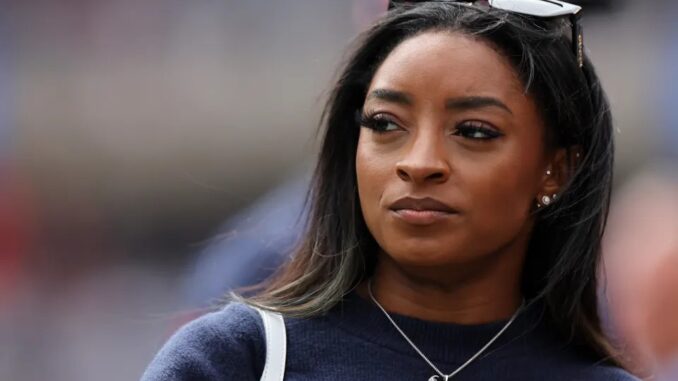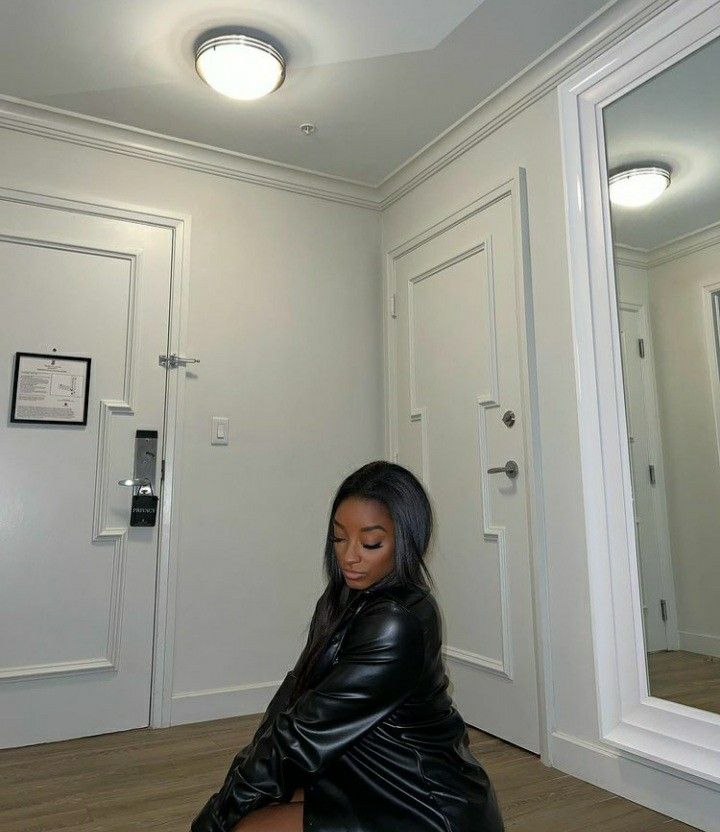
Simone Biles clarified her comments on Tuesday after a heated social media interaction with conservative activist and former NCAA swimmer Riley Gaines over the weekend over her views on transgender athletes.
In a lengthy post on X, formerly known as Twitter, the 11-time Olympic medalist from Houston wrote that she wanted to “follow up” on her last tweets in which she criticized Gaines for singling out a transgender athlete playing high school softball. “I’ve always believed competitive equity & inclusivity are both essential in sport,” Biles wrote. “The current system doesn’t adequately balance these important principles, which often leads to frustration and heated exchanges, and it didn’t help for me to get personal with Riley, which I apologize for.”
On Friday evening, Biles tagged Gaines in a post and told her to “bully someone your own size, which would ironically be a male.” The post seemed to be in response to Gaines’ post commenting on the Champlin Park girls softball team led by transgender pitcher Marissa Rothenberger won Minnesota’s Class AAA championship. Gaines shared a Minnesota State High School League post about the team’s victory and wrote, “Comments off lol To be expected when your star player is a boy.”
Biles then followed up and directly shared Gaines’ post and commented “You’re truly sick, all of this campaigning because you lost a race. Straight up sore loser.” Biles’ post continued, “You should be uplifting the trans community and perhaps finding a way to make sports inclusive OR creating a new avenue where trans feel safe in sports. Maybe a transgender category IN ALL sports!! But instead … You bully them … One things for sure is no one in sports is safe with you around!!!!!”
Biles’ references to a lost race and being a “sore loser” stem from Gaines having tied for fifth with trans athlete Lia Thomas in the 200-yard freestyle race during the 2022 NCAA Women’s Swimming and Diving Championships. Thomas was the only transgender athlete in the race. The swimmer subsequently joined the movement to ban trans athletes from women’s sports. Gaines responded to Biles’ posts saying it wasn’t her job or any woman’s “to figure out how to include men in our spaces.”
“Men don’t belong in women’s sports and I say that with my full chest,” Gaines wrote. In her follow up on Tuesday, Biles wrote about the complexity of gender inclusivity and fairness in sports after apologizing to Gaines. “These are sensitive, complicated issues that I truly don’t have the answers or solutions to, but I believe it starts with empathy and respect,” Biles wrote. “I was not advocating for policies that compromise fairness in women’s sports.” While Biles acknowledged current issues and her lack of resolve for them, she stood on her belief that Gaines was in the wrong for targeting Rothenberger. “My objection is to be singling out children for public scrutiny in ways that feel personal and harmful,” Biles wrote. “Individual athletes – especially kids – should never be the focus of criticism of a flawed system they have no control over.”
Biles concluded by saying it should be on those regulating competitions to fix that flawed system, not the athletes themselves. “I believe sports organizations have a responsibility to come up with rules supporting inclusion while maintaining fair competition,” Biles wrote. “We all want a future for sport that is fair, inclusive, and respectful. Xoxo Simone”. Biles has been a mental health advocate since taking herself out of competition during the 2021 Olympic Games in Tokyo to focus on her own mental and emotional well-being. Biles returned for the 2024 Paris Olympic Games, where she cemented her title as the most decorated female gymnast.
In the ever-evolving landscape of sports and social issues, few debates have been as polarizing as the inclusion of transgender athletes in women’s competitions. Recently, this discourse reached a fever pitch when Olympic gymnast Simone Biles and former collegiate swimmer Riley Gaines found themselves at odds over this very topic. The ensuing public exchange not only highlighted the deep divisions within the sports community but also underscored the complexities athletes face when navigating personal beliefs and public platforms.
Background of the Dispute
The controversy ignited when Riley Gaines, a vocal critic of transgender women participating in women’s sports, criticized a high school softball team’s championship photo, alleging the presence of a transgender player. Simone Biles, known for her advocacy of inclusivity, responded by defending the athlete, emphasizing the importance of acceptance and understanding in sports. However, Biles’ initial remarks were perceived by some as personal attacks, leading to a swift backlash.
Simone Biles’ Apology
Recognizing the potential harm her words may have caused, Biles issued a public apology, acknowledging that her comments had become personal and detracted from the core issue. She expressed regret for any offense caused and reaffirmed her commitment to supporting transgender athletes, emphasizing the need for respectful dialogue and empathy in addressing complex issues.
Riley Gaines’ Stance
Riley Gaines, a 12-time NCAA All-American swimmer, has been a prominent figure in advocating for the exclusion of transgender women from women’s sports. Her activism gained national attention following a tie with transgender swimmer Lia Thomas at the 2022 NCAA championships. Since then, Gaines has been outspoken in her belief that allowing transgender women to compete in women’s sports undermines fairness and the integrity of female athletics.
The Role of Social Media in the Debate
The rapid dissemination of opinions via social media platforms has amplified the debate, allowing for immediate reactions but also escalating tensions. Both Biles and Gaines utilized these platforms to voice their perspectives, leading to widespread public discourse. While social media serves as a tool for advocacy, it also poses challenges in maintaining respectful and constructive conversations.
Public Reactions and Media Coverage
The public’s response to the feud has been mixed, with some supporting Biles for her apology and advocacy for transgender inclusion, while others align with Gaines’ stance on preserving fairness in women’s sports. Media outlets have extensively covered the exchange, further fueling the conversation and highlighting the broader societal implications of the debate.

The Impact on Policy and Sports Organizations
In the wake of the controversy, organizations such as USA Gymnastics have reevaluated their policies regarding transgender athlete participation. The debate has prompted discussions about the need for clear guidelines that balance inclusivity with fairness, ensuring that all athletes have equal opportunities to compete.
The Importance of Empathy and Understanding
At the heart of this dispute lies a fundamental need for empathy and understanding. While differing opinions exist, it is crucial to approach such sensitive topics with respect and a willingness to listen. Constructive dialogue can lead to solutions that honor the rights and dignity of all athletes.
Conclusion
The exchange between Simone Biles and Riley Gaines serves as a microcosm of the larger conversation surrounding transgender inclusion in sports. It underscores the challenges athletes face in balancing personal beliefs with public responsibilities. Moving forward, it is essential to foster environments that encourage respectful dialogue, promote inclusivity, and uphold the values of fairness and equality in sports.